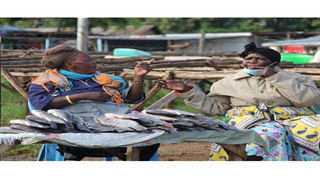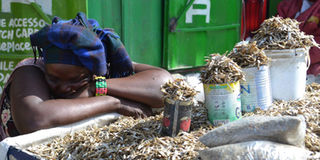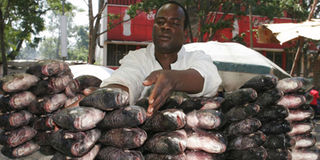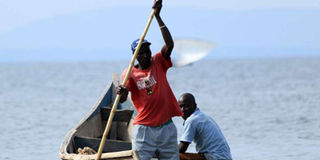
Traders selling fish at a fish market. Many fishmongers have suffered huge losses due to low sales of fish since the pandemic hit.
| George Odiwour | Nation Media GroupKisumu
Premium
Bleak future for fishmongers as Covid eats into profits
It is around 8am on Thursday, and Mama Sarah Auma Owiti, is sitting next to one of the slabs allocated to her at the fresh fish market in a corner of Kisumu’s main bus terminus.
Auma, a fish vendor, is a worried woman because the vehicle that is bringing her the fish she ordered has not arrived, yet it is time to supply the makeshift eateries at the bus park as well as the neighbourhoods.

An omena trader waiting for customers.
One hour later, the fish arrives and she starts getting busy even as she narrates to us how sales have plummeted since the Covid-19 pandemic hit.
The delays are the order of the day. With disillusionment, she says never in her 36 years in the fish business has she ever witnessed a disease that has affected her like Covid-19 has done in the past one-and-a-half years.
She reveals to the Nation that since the pandemic hit, the prices of fish have been oscillating, depending on availability.
“The many vehicles that used to ferry fish have reduced in number and we now have to scramble for the fewer fish in the market. By the time they reach here, our customers are rushing home to beat the curfew so we have to either sell them at reduced prices or risk having them go bad,” says Auma.
While she reduces the price by at least Sh100 to get her capital back and keep her business afloat, her colleagues choose to freeze the fish, an additional cost.
Influx of fish imports
The recently enhanced containment measures announced by the President on June 18 made things worse.
She used to be supplied with 20 kilogrammes of fish, which goes for about Sh6,100 including transportation, a stock she could clear in a day and make a profit of about Sh1,500. This same stock now goes for almost one week.
The Covid-19 containment measures in the lake region have boxed fishermen and mongers into a corner, with many now opting to seek other means of earning a livelihood.

ark Okoth, a fishmonger at Oile market in Kisumu, arranges tilapia for sale.
From reduced trucks ferrying fish, to a drop in prices, fish mongers are feeling the pinch of the containment measures imposed on the 13 counties of the Lake Region Economic Bloc.
This comes as they grapple with the influx of fish imports from China, as well as those engaging in cage fish farming and ponds, all fighting for a market with reduced spending power.
The 13 counties are Kisumu, Siaya, Homa Bay, Migori, Busia, Vihiga, Kakamega, Bungoma, Nyamira, Kisii, Trans Nzoia, Bomet and Kericho.
The measures included a 7pm to 4am curfew, ban on public gatherings, and restrictions on movements inside and out of the region.
Mrs Auma, who gets her fish from Uyoma, Yimbo, Sakwa and Busia, says the trips made by the lorries and matatus to bring back fish have reduced their daily trips to just two a week.
Orders she used to get from eateries and hotels have dropped.
Florence Adoyo Otieno, who gets dagaa popularly known as omena from Uhanya Beach in Yimbo is also feeling the pinch.
Curfew restrictions
The curfew and restricted movements are making many fishermen get stuck with a pile of fish that goes bad because most traders cannot make it to the beach and head to the markets in time.
“When fresh omena land on these beaches, they come at around midday and they have to be dried for hours before they are packed well and traders take them to other markets,” says Adoyo.
The curfew is hindering fishing expeditions for thousands of fishermen on Lake Victoria. They are now being forced to change tack and fish during the day.
Joseph Ochieng, the chairman of Usenge Beach Management Unit (BMU) says those affected most are the fishermen dealing with the Nile perch, who sometimes do not find time to sell their fish because they arrive late at the landing beaches.

Kisumu locals fish in Lake Victoria.
“Most of them use boats that have sails, but when the weather is not favorable, they delay in the lake and by the time they come back, it is almost 7pm and they, therefore, have to grapple with storage and where they will sleep,” he explains.
The total lockdown in Uganda has also affected the availability of fish in the Lake Region since the movement of water vessels from Uganda to Kisumu has been limited.
There is a shortage of fish because of this and the few that manage to sneak in have increased prices.
“A fish that costs Sh180 in Uganda by the time it reaches here in Usenge is Sh300,” said Mr Ochieng.
Some retailers have now resorted to digital marketing to push their stock.
Morin Odira has now resorted to selling her fish online and it is working for her.
“Most of the fish are sold in the evening when most customers are from their work stations and they usually rush to beat the curfew. So I have resorted to marketing my fish online and getting new customers to remain afloat,” says Odira.
She, however, says fish prices have skyrocketed since fewer fishermen are going for their expeditions in the lake, and since demand is high and the supply is low, they are forced to increase the price.





